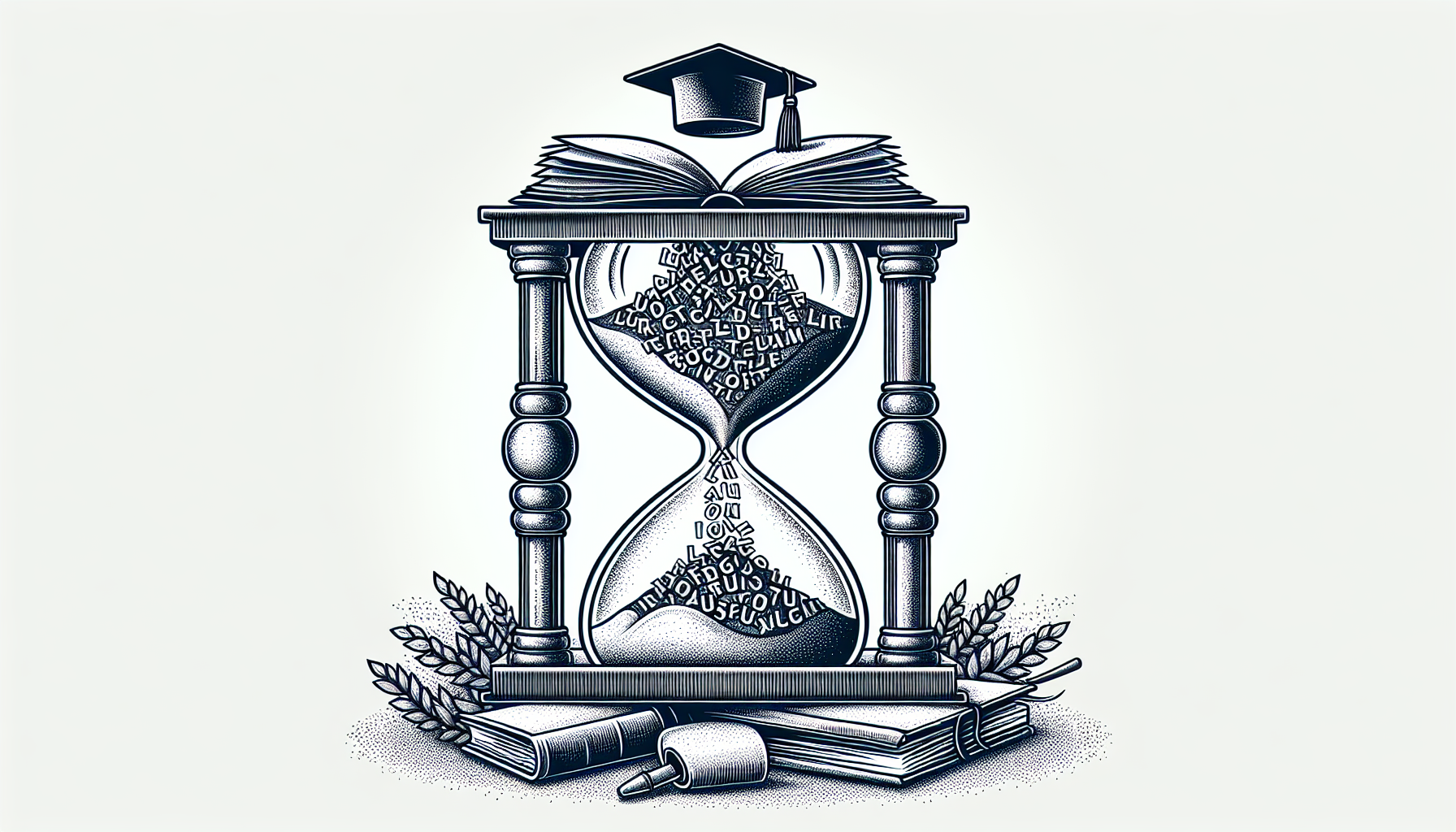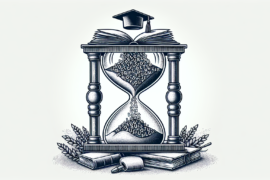Imagine being a college student who is not only academically successful but also feels fulfilled and balanced in all aspects of life. How amazing would that be? Well, I’m here to tell you that it’s completely achievable! In this article, we will uncover the secrets of highly effective college students and explore the seven habits that can turn you into one. These habits are not only about studying harder or managing time better; they are about fostering personal growth, nurturing relationships, and embracing a holistic approach to college life. So, get ready to unlock your potential and become the best version of yourself as a college student!

Habit 1: Goal Setting
Understanding the importance of setting goals
Setting goals is a crucial habit for college students as it provides direction and motivation. By having clear goals, you can stay focused and make the most of your college experience. Whether it’s academic, personal, or career-related, goals help you prioritize your time and energy effectively. They give you something to strive for and a sense of purpose, which can greatly enhance your overall satisfaction and success in college.
Identifying short-term and long-term goals
When it comes to goal setting, it’s essential to consider both short-term and long-term goals. Short-term goals are smaller, more achievable objectives that can be accomplished within a relatively short period of time, such as completing a project or getting a good grade on an upcoming exam. On the other hand, long-term goals are more significant and may require more time and effort to achieve, such as graduating with honors or securing a dream job after graduation. By setting a combination of short-term and long-term goals, you can create a sense of balance and progress in your college journey.
Breaking down goals into actionable steps
Setting goals is just the first step; breaking them down into actionable steps is what will help you turn your aspirations into reality. Instead of feeling overwhelmed by the enormity of a goal, break it down into smaller, manageable tasks. This will make the goal more attainable and provide you with a clear roadmap to follow. By taking one step at a time and celebrating small victories along the way, you’ll build momentum and stay motivated to keep pushing forward towards your goals.
Habit 2: Time Management
Creating a schedule or planner
Time management is a key habit for college students, as the demands of academic and personal life can often feel overwhelming. Creating a schedule or planner is an effective way to stay organized and ensure that you allocate your time wisely. Start by listing all your commitments, such as classes, study time, extracurricular activities, and personal obligations. Then, assign specific time slots to each task or activity. Having a visual representation of your schedule will help you identify any gaps or overlaps, enabling you to make adjustments and maximize your productivity.
Prioritizing tasks
With so much going on in college, it’s crucial to prioritize your tasks to ensure that you’re focusing on what matters most. Begin by identifying the most important and time-sensitive tasks, and tackle those first. This way, you can avoid the stress of last-minute deadlines or neglected responsibilities. It’s also important to consider the impact and significance of each task. By prioritizing effectively, you can complete your most important tasks with a clear mind and allocate the appropriate amount of time and energy to each one.
Avoiding procrastination
Procrastination is the enemy of productivity and can hinder your progress as a college student. To combat this habit, it’s essential to understand the underlying causes of procrastination, such as fear of failure or lack of motivation. Once you’ve identified these triggers, you can take steps to overcome them. Break tasks into smaller, more manageable parts, and set realistic deadlines for each. Incorporate regular breaks to prevent burnout and reward yourself after completing tasks. By becoming aware of your procrastination tendencies and implementing strategies to combat them, you’ll be able to make the most of your time and achieve greater success in college.
Habit 3: Effective Communication
Listening actively and attentively
Effective communication is a vital skill for college students as it enhances your ability to collaborate, understand others, and express yourself clearly. One of the most important aspects of effective communication is active listening. Instead of merely hearing the words spoken to you, strive to listen attentively and engage with the speaker. Maintain eye contact, ask clarifying questions, and demonstrate genuine interest in what they are saying. By practicing active listening, you’ll develop stronger relationships, gain valuable insights, and avoid misunderstandings.
Expressing ideas clearly and concisely
Being able to express your ideas clearly and concisely is essential in college, whether you’re participating in class discussions, giving presentations, or writing papers. To enhance your communication skills, practice articulating your thoughts in a coherent and organized manner. Focus on being clear and concise, using appropriate vocabulary and avoiding jargon or excessive complexity. Pay attention to non-verbal cues, such as body language and tone, to ensure your message aligns with your intentions. By refining your ability to express ideas effectively, you’ll become a more persuasive and influential communicator.
Asking for help when needed
College can be challenging, and there may be times when you need assistance or guidance. One of the most crucial aspects of effective communication is knowing when and how to ask for help. Whether you’re struggling with a difficult concept or experiencing personal challenges, reaching out to professors, advisors, or classmates can provide valuable support and resources. Don’t be afraid to ask questions or seek clarification when needed. Remember, seeking help is a sign of strength, and it can lead to better understanding, growth, and ultimately, success in college.
Habit 4: Active Learning
Engaging in class participation
Active learning involves actively engaging with the material presented in class, rather than passively absorbing information. One of the most effective ways to do this is through class participation. By actively participating in discussions, asking questions, and sharing your insights, you enhance your understanding and retention of the material. Additionally, participating in class can help you build relationships with your professors and classmates, creating a supportive and collaborative learning environment.
Taking thorough notes
Taking thorough and organized notes is key to active learning. This habit allows you to synthesize information in real-time, identify key points, and create a valuable resource for future reference. Develop a note-taking system that works for you, whether it’s using bullet points, diagrams, or highlighting important information. Review and revise your notes regularly, reinforcing your understanding of the material and improving your recall during exams and assignments.
Reviewing and summarizing information regularly
Regularly reviewing and summarizing information is crucial for effective learning and retention. Instead of cramming all the information right before an exam, create a study schedule that includes regular review sessions. Summarize key concepts, create flashcards, or engage in group discussions to reinforce your understanding. By reviewing and summarizing information regularly, you’ll build a solid foundation of knowledge, making it easier to connect new material with what you have already learned.

Habit 5: Healthy Lifestyle
Getting enough sleep
A healthy lifestyle is essential for college students as it directly impacts your physical and mental well-being. One of the most crucial aspects of a healthy lifestyle is getting enough sleep. Adequate sleep is vital for memory consolidation, concentration, and overall cognitive function. Aim for seven to nine hours of sleep each night to ensure you wake up refreshed and ready to tackle the day. Establish a consistent sleep schedule, create a relaxing bedtime routine, and minimize distractions in your bedroom to optimize your sleep quality.
Maintaining a balanced diet
A balanced diet plays a significant role in maintaining your energy levels, concentration, and overall health. Aim to consume a variety of nutrient-dense foods, including fruits, vegetables, whole grains, lean proteins, and healthy fats. Avoid excessive consumption of sugary drinks, processed foods, and snacks high in saturated fats or salt. Be mindful of portion sizes and listen to your body’s hunger and fullness cues. Stay hydrated by drinking plenty of water and limit your intake of caffeine and sugary beverages. By nourishing your body with a balanced diet, you’ll have the energy and focus needed to excel in college.
Incorporating exercise into daily routine
Regular physical activity is not only crucial for your physical health but also has numerous benefits for your mental well-being and academic performance. Aim for at least 150 minutes of moderate-intensity aerobic activity or 75 minutes of vigorous-intensity activity each week. Find activities you enjoy, whether it’s going for a run, taking a yoga class, or joining an intramural sports team. Incorporate exercise into your daily routine by scheduling it in your planner or incorporating it into study breaks. Not only will exercise boost your mood and reduce stress, but it will also increase your energy levels and improve your cognitive function.
Habit 6: Strong Study Habits
Creating a designated study space
Having a designated study space is essential for maintaining focus and productivity. Find a quiet and comfortable area where you can concentrate without distractions. Remove any clutter or unnecessary items that may hinder your focus. Personalize your study space with items that inspire and motivate you, such as pictures, quotes, or plants. Establish a routine by consistently studying in the same location, as your brain will associate that space with learning and focus.
Breaking study sessions into manageable chunks
Instead of attempting to study for hours on end, break your study sessions into smaller, more manageable chunks. Research suggests that shorter study sessions with regular breaks lead to better learning and retention. The Pomodoro Technique is a popular method that involves studying for 25 minutes, followed by a 5-minute break. After completing four Pomodoro cycles, take a more extended break, typically around 15-30 minutes. By adopting this approach, you’ll maintain your focus, prevent burnout, and make the most efficient use of your study time.
Utilizing effective study techniques
Different study techniques work for different individuals, and it’s essential to find methods that suit your learning style and preferences. Some effective study techniques include active recall, where you test your memory by recalling information without looking at your notes, and spaced repetition, which involves reviewing information at increasing intervals over time. Explaining concepts to others, creating mind maps, and using mnemonic devices are also effective strategies. Experiment with different techniques and identify the ones that help you better understand and retain information.
Habit 7: Self-Reflection and Growth
Reflecting on personal strengths and weaknesses
Self-reflection is a powerful habit that allows you to gain insight into your personal strengths and weaknesses. Regularly take the time to reflect on your experiences, accomplishments, and areas where you can improve. Understand your learning style, how you best manage your time, and the environments where you thrive. By acknowledging your strengths and weaknesses, you can develop strategies to capitalize on your strengths and address areas that need improvement. Self-reflection is a crucial step towards personal growth and continuous improvement.
Seeking feedback and learning from mistakes
Feedback is a valuable tool for growth and improvement. Actively seek feedback from professors, classmates, and mentors to gain different perspectives and insights. Embrace constructive criticism as an opportunity to learn and grow. Additionally, reflect upon your mistakes and setbacks and identify the lessons they offer. Use your failures as stepping stones towards success, adjusting your approach and striving to do better. By actively seeking feedback and learning from your mistakes, you’ll develop resilience and continually improve your performance.
Continuously striving for self-improvement
A highly effective college student never settles for mediocrity but constantly strives for self-improvement. Continuously set new goals and challenge yourself to go beyond your comfort zone. Take advantage of opportunities for personal and professional development, such as workshops, seminars, or internships. Seek out mentors who can guide and inspire you on your journey. Remember that self-improvement is a lifelong process, and by embracing it, you’ll not only excel in college but also prepare yourself for a successful and fulfilling future.
Habit 8: Networking and Building Relationships
Attending campus events and joining clubs
Networking and building relationships can have a significant impact on your college experience and future career prospects. Actively engage with the college community by attending campus events, such as guest lectures, workshops, or social gatherings. Join clubs or organizations related to your interests, as they provide opportunities to meet like-minded individuals and develop valuable connections. Engaging in these activities will not only expand your social circle but also provide you with a support system and potential mentors.
Forming study groups and collaborative partnerships
Collaboration and teamwork are important skills that can be beneficial throughout your college journey and beyond. Form study groups with classmates to promote active learning, exchange ideas, and support each other academically. Share resources, brainstorm solutions, and take turns explaining concepts to one another. Collaborative partnerships can also extend beyond academic settings. Work on group projects, participate in extracurricular activities, or volunteer together. By fostering these relationships, you’ll develop vital interpersonal skills and create lasting connections.
Building relationships with professors and mentors
Building meaningful relationships with professors and mentors is invaluable in college. Professors can provide mentorship, guidance, and opportunities for research, internships, or recommendation letters. Attend office hours, actively participate in class, and seek their advice on academic and career-related matters. Additionally, seek out mentors who can provide guidance and support throughout your college journey. Mentors can offer valuable insights, share their experiences, and help you navigate challenges. Building relationships with professors and mentors not only enhances your learning experience but also opens doors to exciting opportunities.
Habit 9: Adaptability and Resilience
Handling unexpected challenges and setbacks
College life is full of surprises and challenges. Being adaptable and resilient is crucial for navigating unexpected situations effectively. Embrace change and uncertainty, and view challenges as opportunities for growth. When faced with setbacks, maintain a positive mindset and focus on developing solutions rather than dwelling on the problem. Seek support from friends, family, or campus resources when you need it. By practicing adaptability and resilience, you’ll be better equipped to overcome obstacles and thrive in the face of adversity.
Developing problem-solving skills
Problem-solving skills are essential for college students as they enable you to approach challenges with a structured and logical mindset. Enhance your problem-solving abilities by breaking down complex issues into smaller, more manageable parts. Brainstorm potential solutions, evaluate their pros and cons, and select the most effective course of action. Collaborate with others to gain different perspectives. Additionally, cultivate a growth mindset, which views challenges as opportunities for growth and learning. By developing strong problem-solving skills, you’ll become better equipped to overcome obstacles and find creative solutions.
Adapting to new environments and situations
College often involves transitioning to new environments, whether it’s moving to a different city or adjusting to the demands of higher education. Adapting to new situations is essential for thriving in college. Embrace new experiences, be open to different perspectives, and step outside your comfort zone. Build a support system of friends and mentors who can provide guidance and encouragement during these transitions. Remember that adaptation takes time, and it’s okay to feel uncomfortable initially. By embracing change and actively seeking new opportunities, you’ll develop resilience and adaptability.
Habit 10: Stress Management
Identifying stress triggers
Stress is a common experience in college, but managing it effectively is crucial for your overall well-being and academic success. Start by identifying your stress triggers. It could be upcoming exams, overloaded schedules, social pressures, or personal responsibilities. Understanding what causes stress allows you to take proactive steps to address and manage it effectively. Keep a stress journal to track your triggers and the associated stress symptoms. By identifying patterns, you can develop strategies to minimize stress and promote a healthier lifestyle.
Utilizing stress-reduction techniques
Once you’ve identified your stress triggers, it’s important to have a range of stress-reduction techniques at your disposal. Experiment with different strategies to find what works best for you. Some effective stress-reduction techniques include deep breathing exercises, mindfulness and meditation, engaging in physical activity, practicing relaxation techniques, or engaging in hobbies or activities that bring you joy. Prioritize self-care by setting aside time for activities that help you relax and recharge. By incorporating stress-reduction techniques into your daily routine, you’ll be better equipped to manage stress and maintain a healthy balance in college.
Seeking support from friends, family, or campus resources
Managing stress on your own can be challenging, and it’s essential to seek support when needed. Reach out to friends, family, or trusted individuals in your life who can provide a listening ear or offer guidance. Utilize the resources available on your college campus, such as counseling services, support groups, or workshops. These resources are designed to help you navigate the challenges of college life and can provide valuable support and coping strategies. Remember that seeking support is a sign of strength, and talking to others can help alleviate stress and provide a fresh perspective on your challenges.
In conclusion, incorporating these ten habits into your college experience can greatly enhance your effectiveness and success as a student. By setting goals, managing your time effectively, practicing effective communication, engaging in active learning, maintaining a healthy lifestyle, developing strong study habits, reflecting on personal growth, networking and building relationships, being adaptable and resilient, and managing stress, you’ll be well-equipped to navigate the challenges and opportunities that college presents. Embrace these habits wholeheartedly, and you’ll not only excel academically but also develop the valuable skills and mindset needed for a fulfilling and successful future.
